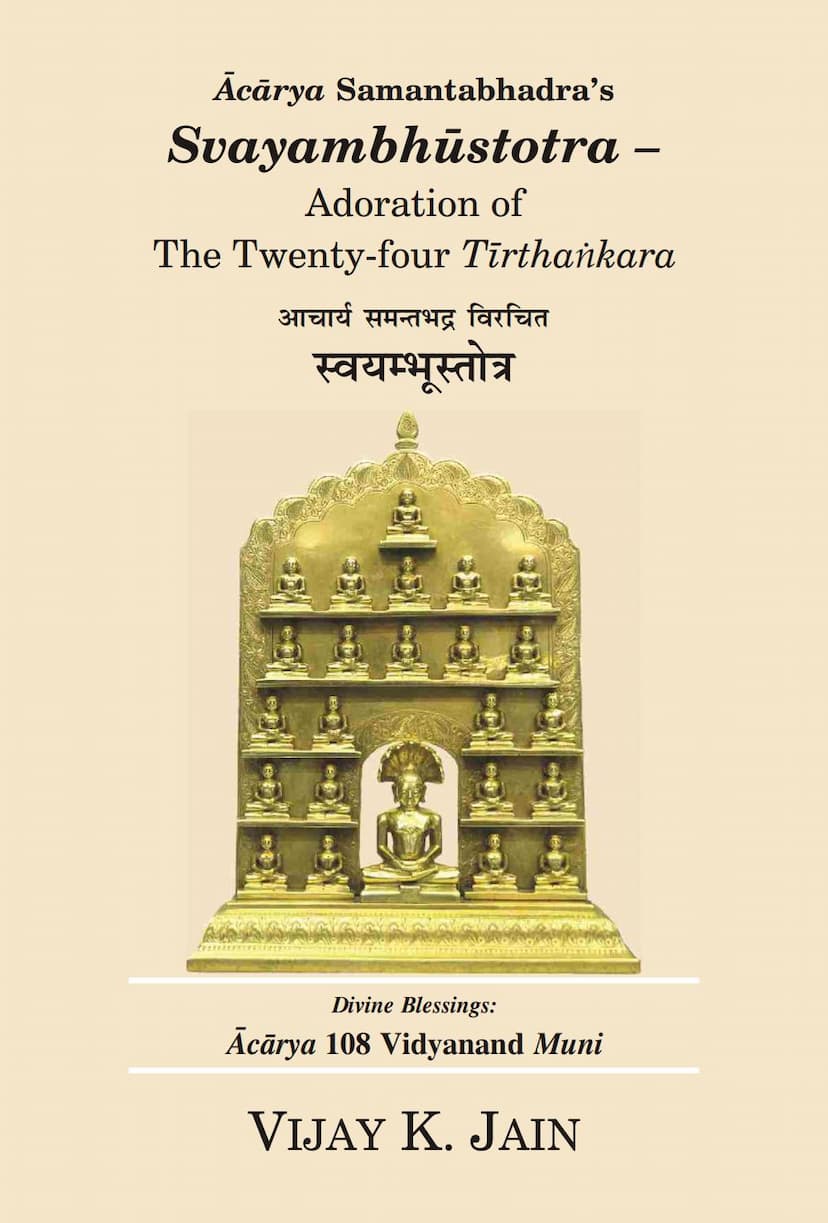Swayambhustotra
Added to library: September 2, 2025

Summary
This document is an English translation and exposition of the Swayambhūstotra, a revered Jain text composed by Acharya Samantabhadra. The Swayambhūstotra is an adoration of the Twenty-four Tirthankaras, the most worshipful supreme beings in Jainism.
Here's a summary of the key aspects and content:
Title and Author:
- Book Title: Swayambhūstotra – Adoration of The Twenty-four Tīrthankara
- Author: Acharya Samantabhadra
- Translator/Commentator: Vijay K. Jain
- Publisher: Vikalp Printers
- Divine Blessings: Acharya 108 Vidyanand Muni
Core Message and Philosophy:
- The book emphasizes that true adoration should be based on proper assessment and understanding of the praiseworthiness of a deity, not blind faith.
- It highlights the importance of reasoning and discrimination, criticizing superstitions that arise from ignorance.
- The text underscores the philosophical depth of Jain devotional literature, which is not merely light reading but is imbued with profound philosophical principles.
- Acharya Samantabhadra's work is described as containing the essence of the entire twelve-limbed Jain scripture (Dvādaśānga).
- A central theme is the Jain doctrine of anekāntavāda (many-sidedness), which posits that reality has multiple aspects, and a complete understanding requires considering all these perspectives. This is contrasted with absolutistic viewpoints (ekāntavāda) that lead to one-sided and incomplete understandings of truth.
- The ultimate purpose of spiritual practice is to acquire the Three Jewels (Ratnatraya): right faith, right knowledge, and right conduct, which lead to liberation.
Acharya Samantabhadra:
- He is lauded as a master of philosophical reasoning, a brilliant grammarian, logician, disputant, and preacher of Jainism.
- His intellect is described as unparalleled, capable of discerning right from wrong and illuminating the right path to Supreme Bliss.
- The book recounts a biographical sketch of Acharya Samantabhadra, detailing his struggle with the disease of bhasmaka and a miraculous event involving an idol that revealed the image of Lord Candraprabha.
- His notable works include Apta-mīmāṁsā, Ratnakaraṇḍaka-śrāvakācāra, Swayambhūstotra, and Yuktyanuśāsana.
Acharya Vidyanand Muni:
- He is described as a highly respected spiritual leader and a practitioner of rigorous Jain asceticism for over 50 years.
- He is recognized as a staunch exponent of anekāntavāda, capable of reconciling apparent contradictions in scriptures and philosophies.
- The book acknowledges his "divine blessings" and support for the translation work.
Structure of the Swayambhūstotra:
- The book contains hymns dedicated to each of the Twenty-four Tirthankaras, from Lord Rṣabhanātha to Lord Vira.
- Each Tirthankara is introduced with their name, their symbolic representation (चिह्न - chihna), and their respective verses from the Swayambhūstotra.
- Each verse is accompanied by a Sāmānyārtha (General Meaning), explaining the verse's philosophical and spiritual import in Hindi, and a detailed English translation/explanation.
- The explanations delve into the philosophical principles, the teachings, and the exemplary lives of the Tirthankaras.
- The book also includes appendices on the Divisions of Empirical Time (Jain cosmology) and the Life-story of the Twenty-four Tirthankara, providing biographical details and historical context.
- A Guide to Transliteration is included for pronunciation.
Key Teachings and Themes within the Tirthankara Hymns:
- Lord Rṣabhanātha: The first Tirthankara, who taught the means of livelihood, renounced worldly possessions, and destroyed karmas.
- Lord Ajitanātha: The unconquerable, whose teachings guided the virtuous.
- Lord Sambhavanātha: The bestower of happiness, who taught detachment from sensual pleasures.
- Lord Abhinandananātha: Praised for virtues, who taught renunciation and non-attachment.
- Lord Sumatinātha: Known for right knowledge, who expounded the doctrine of anekāntavāda and the interdependent nature of reality.
- Lord Padmaprabha: His divinity is compared to the sun and lotuses, signifying purity and enlightenment.
- Lord Supārsvanātha: Emphasized the importance of meditation on the Self over sensual pleasures and the nature of reality.
- Lord Candraprabha: Described with moon-like splendor, his teachings are soothing and illuminating.
- Lord Suvidhinātha (Puspadanta): Contradicted absolutistic viewpoints and upheld the doctrine of conditional predication (syādavāda).
- Lord Śītalanātha: His words are described as cooler and more soothing than sandalwood or moonbeams, bringing peace.
- Lord Śreyānsanātha: His teachings are compared to the sun, dispelling ignorance and guiding towards liberation.
- Lord Vāsupūjya: Worshipped by gods and men, his teachings highlight the purity of Self and the futility of external worship.
- Lord Vimalanātha: Emphasized the interdependent nature of reality and the invalidity of one-sided views.
- Lord Anantanātha: Conquered the "demon of delusion" and attained victory over karmas.
- Lord Dharmanātha: Proclaimed the path of righteousness and achieved liberation through austerities.
- Lord Śāntinātha: The bringer of peace, who was both a king and an ascetic, embodying benevolence.
- Lord Kunthunātha: Showed compassion to all beings and promulgated the path to liberation.
- Lord Aranātha: Highlighted the infinite nature of his virtues and the inadequacy of ordinary praise, emphasizing the truth of anekāntavāda.
- Lord Mallinātha: Possessed of direct knowledge and radiant glory, his teachings are sweet and lead to liberation.
- Lord Munisuvratanātha: Observed strict vows and achieved liberation through pure meditation.
- Lord Naminātha: Known for humility and detachment, he taught the path to liberation and the nature of reality.
- Lord Ariṣṭanemi (Neminātha): Embodied renunciation and taught the path to supreme happiness through self-realization.
- Lord Pārsvanātha: Faced adversity with equanimity and attained omniscience, his teachings are pure and enlightening.
- Lord Vira (Mahāvīra): The last Tirthankara, known for his supreme virtues, his doctrine of syādavāda is flawless and beneficial.
Overall Purpose: The book serves as a bridge for English readers to access the profound spiritual and philosophical teachings embedded within the Swayambhūstotra, making them understandable and relevant for contemporary spiritual seekers. It aims to foster devotion, deepen understanding of Jain philosophy, and inspire individuals towards self-realization and liberation.